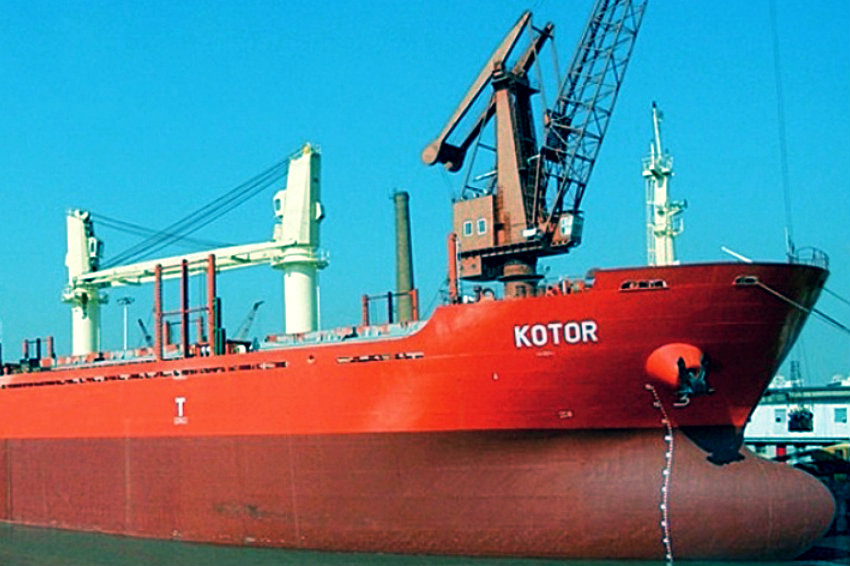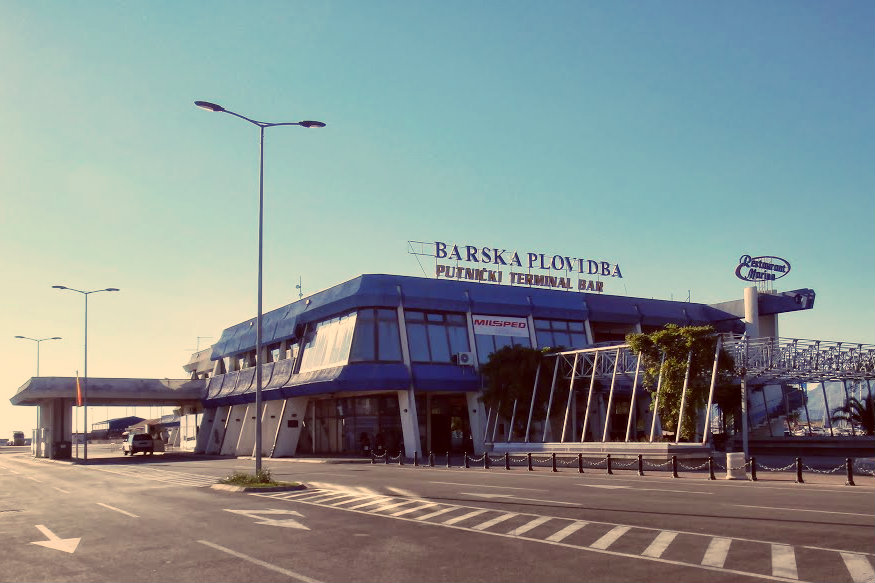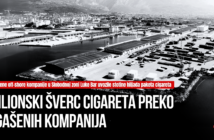MANS Investigation Center and Vijesti reveal how the Government entered into the investment of restoration of the merchant navy
The Government of Montenegro has contracted business arrangements for the purchase of new ships for the Montenegrin shipping company Barska plovidba, which are worth at least 110 million US dollars, without proper analysis of the economic viability of those projects at the time of the greatest financial crisis. That is why there is a real danger that a significant portion of state guarantees given on that basis will be paid by Montenegrin citizens.
The Government of Montenegro issued in 2010 and 2013 state guarantees worth around 93.7 million dollars for the maritime companies in which the government is majority shareholder, for the purchase of four ships. Credit arrangements were implemented in cooperation with the Chinese company Poly Technologies which built the ships, while the Chinese state-owned EXIM Bank provided the loan. The contract provides that in the event of a dispute on the payment of the guarantees arbitration will be organized in Beijing.
According to official data that MANS Investigation Center and the daily Vijesti collected using the Law on Free Access to Information, in 2007 the government adopted a detailed study on the economic justification of the procurement of ships for Crnogorska plovidba, the company it had founded a few years earlier with the aim to restore the merchant fleet after the collapse of Jugooceanija.
The Study envisaged the purchase of two 17-year old ships. The total investment value was approximately $50 million, and it was expected that at the end of the investment period of 12 years there would be $14.8 million of cash from continuing operations and an additional $5.6 million granted after the ships were cut into scrap metal at the end of their working life.
The projection of the economic justification is viewed through earned income in exports, the impact on the employment, relationship with the education system and development opportunities which endorse the construction of transport infrastructure and combined transport.
During the formation of Crnogorska plovidba in 2003, it was planned that the funds from the privatization of Jugopetrol from Kotor, as well as a part of the budgetary funds, are sufficient for providing loans for the purchase of three to four second-hand vessels. However, as noted in the study, the funds from the privatization of Jugopetrol were spent for other purposes, there were no budgetary resources and support from the banks could not be provided without government guarantees.
“The basic concept of this investment project implies that the government has no intention to maintain the stake in the Montenegrin navigation for long”, says the 2007 study.
However, contrary to what the Study envisaged, in 2009, Crnogorska plovidba entered into negotiations with the Chinese company Poly Technologies on the construction of two handy ships for transporting bulk cargo. The state-owned Exim Bank of China approved the following year a loan in the amount of $55.7 million, with participation of $8.3 million. Contracted grace period was five years, the interest rate 3 percent, while the government issued a state guarantee to cover the equity of $47.3 million.
Barska plovidba projected only increase in freight rates, not their decrease
It is very interesting that the business plan for the procurement of cargo ships of Barska plovidba from 2012 was based solely on the growth of freight rates in the world market at the rate of two percent per year, while a projection based on decrease of freight rates was never made.
The business plan anticipated revenues of seven million for the two ships during the period of loan repayment in 2014, in 2015 they were 7.1 million. The similar sum is in the following years, while the sum would reach $9.9 million by 2032, at the end of the repayment period.
Also, for 2015, the profit of the company was estimated at 3.6 million, but official data showed that Barska plovidba had an uncovered loss of €6.3 million.
At the General Meeting of Shareholders of Barska plovidba in 2015, it was announced that due to the decline of the euro against the dollar, unrealized exchange difference was leading company into loss.
Former Executive Director Rade Radoman pointed at the request of the tenant for breach of contract after the first year of commercial exploitation, due to a significant drop in rents in the global shipping market. He said that the tenant, Sea Pioneer in London, needed to be met in terms of price correction of the lease.
According to the arrangement concluded in September 2014, Sea Pioneer pays Barska plovidba around $10,000 a day per ship, which is higher than the current market price. Therefore, the tenant has requested from the management of Barska plovidba to revise the contract and reduce the daily rent, starting retroactively from the second year of the contract. At the same time, the daily amount of rent would be $8,000 minus 3.75 percent brokerage commission.
The problem for the company, excluding more competitive transport route that leads through Albania and its port of Durres, from where cheaper and more up-to-date ferry boats travel to Italy and Greece, is primarily the dilapidated ferry “Sveti Stefan II” built in 1973.
The loan for the purchase of the vessels was contracted in the year of the biggest financial crisis in the world market and at the time when the domestic economic system was facing many difficulties. The global market was also hit by the crisis, but it is not known whether because of new circumstances a new economic feasibility study on the procurement of ships for Crnogorska plovidba was ever made.
Ships named “Kotor” and “Dvadeset prvi maj” were delivered to Crnogorska plovidba in 2012. Since then, they have been leased by the UK company. However, it soon became obvious that the shipping company cannot regularly repay the loan without help from the state budget.
At the end of 2014 Crnogorska plovidba reported accumulated loss of around €4.6. As stated in the audit report at the end of 2014, short-term provisions and liabilities of the company were greater than its current assets by approximately €800,000. At the same time, the cost of rent for one ship have been reduced, which indicates an uncertainty in the company’s ability to operate in accordance with the principle of continuity of operations.
The management quickly became aware of the problem. Therefore, the Board of Directors emphasizes in the 2014 action plan that the principal of the loan with the Exim Bank is becoming due in 2015, and it is necessary to begin negotiations on the rescheduling of loans as soon as possible and to seek from the Chinese partners to prolong the repayment deadline from 15 to 20 years.
In February 2015, Crnogorska plovidba signed a new contract for the lease of the ship “Kotor” with correction of the rate of rent in accordance with the market situation. The rent rate in 2014 ranged from $8,650 to $11,000 per day. Under the new contract, the lease was reduced to $6,000 per day.
The company ended 2015 with the accumulated loss of €10 million. Its financial report for the first quarter of this year shows that at the end of March 2016 the obligations with the Exim Bank amounts to €35.5 million, with additional €2.5 million of obligations towards the state treasury, which paid an installment for the purchase of the ships at the beginning of the year from the current budget reserve.
In a recent Communication on state government guarantees, the government has indicated that a new installment for Crnogorska plovidba, of around €3 million, is due later this month. According to an estimation from the Ministry of Finance, the company will not be able to fully meet its obligations for 2016.
Crnogorska plovidba and the Ministry of Transport did not answer to the questions of Vijesti regarding the loan arrangement with the Chinese and the justification of entering the investment project of procurement of ships, while the Ministry of Finance said that the opinion had already been given in the Communication on the state guarantees.
When it comes to purchase of ships for Barska plovidba, official figures show that in August 2011 the company’s representatives began negotiations with the Chinese on the construction of the same ships as those being built for Crnogorska plovidba. Soon, high level representatives of the Government got involved into negotiations, and in October 2012 a credit agreement was concluded with the Exim Bank for the period of 20 years, a grace period of five years and an interest rate of two percent.
The equity of $46.4 million means $12.4 million, thus the total loan is $58.8 million. Repayment of the principal of the Chinese loan, for which the state also issued a guarantee, begins in 2018, and the company does not expect to have problems with repayment. In 2013, the company paid an interest rate of €68,500 on the basis of loan, in 2014 it paid €520,000, and in 2015 it paid €928,000.
Barska plovidba paid this year the interest of nearly half a million dollars for January, while approximately the same amount will be due on 21 July. According to the company, the necessary means have already been provided.
‘The assertion that Barska plovidba cannot fulfill its obligations in respect of the loan for the purchase of ships Bar and Budva, for which the government gave the guarantees. On the contrary, I am proud to point out that until now the all the commitments on this basis have been regularly settled, in accordance with their maturity. In addition, the funds for the interest, or the second semi-annual installment which is due for payment on 21 July, have already been provided and are on our company’s account at Societe Generale bank,” says the Acting CEO Dusan Djurisic.
Euro declined, loans more expensive
When the Montenegrin maritime companies contracted ship procurement, the euro was much stronger than the dollar, but the situation has changed in the meanwhile.
The loan for Crnogorska plovidba was approved in 2010. On 26 January that year, the euro stood at 1.40 dollars, while it stands currently at around $1.11. Barska plovidba signed the loan agreement with the Exim Bank in October 2012. The euro was then worth $1.29 at that time.
Asked whether companies under current conditions could survive without state aid, he replied that Barska plovidba was a liquid company, which fulfilled its obligations from its own resources, just as ever.
“In this regard, I want to point out that the company has never been donated funds from the budget of Montenegro on any basis. It has fulfilled all of its obligations in the past, as now, from its own funds. Therefore there is no reason for the state to take over the debt related to the loan for boats,” said Djurovic.
“In doing so,” he added, “given the current inflows from commercial engagement of ships, the company does not expect to get into financial problems in the future, although it is difficult to give predictions, having in mind the unstable maritime market from this distance.”
However, in 2014, the company recorded a loss of €4.6 million. The revenue from services (rent for two ships and passenger transport on the line Bar-Bari) amounted to around €7 million, and, as explained in the report on the operations, the loss is related to unrealized exchange differences on the Exim Bank loan and calculated deferred tax.
In 2015, sales revenues increased to €11.2 million, but at the same time uncovered loss increase and reached the sum of €6.3 million. In this connection, the question is whether the company will be able to pay obligations from 2018, when the equity of the Chinese loan becomes due together with the interest.
The Government has not explained what the real economic parameters are on the basis of which it made projections on the viability of the investment in the purchase of ships, especially why they were procured in the period when not only the local economy was in a huge crisis, but also the circumstances in the global market were least favorable ever.
Crnogorska plovidba gets a loan from IDF
In December 2011, Crnogorsla plovidba obtained a loan of €1.8 million from the Investment and Development Fund for financing the working capital. The government issued a guarantee of 1.5 million, and the loan was used to launch the first ship “Kotor” when it was handed over.
However, Crnogorska plovidba asked for the rescheduling in 2013, so the annex to the contract was made and the repayment period was extended until mid-2015.
Biljana Matijasevic
Ines Mrdovic
This text is created with the support of the European Union within the project “Zero Tolerance to Corruption”. Network for Affirmation of Non-Governmental Sector – MANS is solely responsible for the contents of this article, and the views taken herein shall not in any case be considered as those of the European Union.





